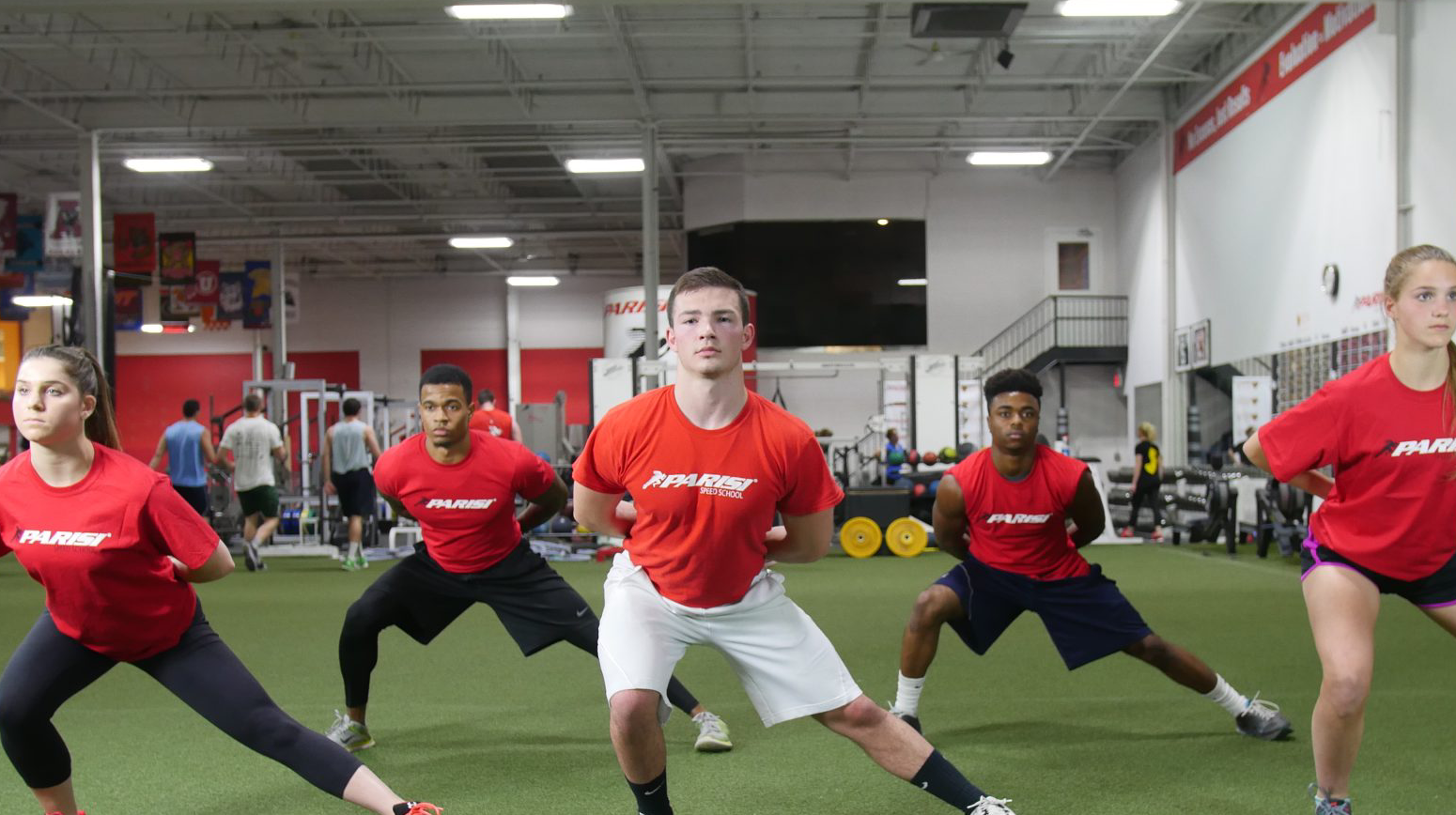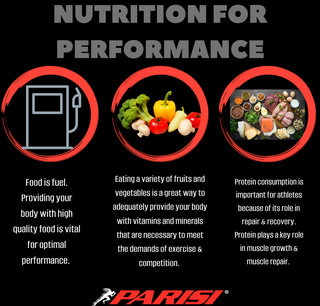Training at the Parisi Speed School is designed to help athletes reach their peak: they get stronger, they improve their speed, but are they fueling their body with the proper nutrition to perform their best?
Proper nutrition for an athlete at any age is extremely important. It can make or break their performance in-season, and make or break their progress in the off-season.
Most of our athletes are looking to gain weight in the off-season, or at least maintain their weight during the season. We understand the need to cut weight for certain sports, and to maintain a healthier lifestyle for some children that train with us. These 5 recommendations will reflect all scenarios.
(Note: I (Cory) am not a registered dietician or even a nutritionist. I have no formal background in the science of nutrition. These points are based on 11+ years of experience successfully coaching youth athletes and researching proper nutrition. For more information from our on-staff nutritionist Matt Ryan, please email [email protected])
How many calories should your athlete consume?
Calories are something that never really come up in our training. As a parent, it is good to understand approximately how many calories per day your child should be eating. We typically use a basic recommendation based on your athlete’s goals:
Weight gain: Body weight x 17
Maintenance: Body weight x 14
Weight loss: Body weight x 11
For example, if an athlete weighs 135 pounds and wants to gain weight for football season, we would recommend they eat approximately 2,295 calories per day. If they aren’t gaining at that many calories, I typically recommend adding 200 calories per day for a week until you see an increase in body weight.
Be sure to adjust your calculation if your athlete gains or loses weight. Once that 135 pound athlete gains 10 pounds, for example, they should base their calculation on 145 x17 in order to continue gaining.
(Note: we have seen many times where a parent thinks their child needs to lose weight and we, and most likely a doctor, disagree. If you are thinking of having your athlete go through a weight loss phase, please consult a medical professional first.)
Pre- and Post-Workout Nutrition
A common question we ask athletes, specifically during strength class, is: what did you eat before you came in today? Some all-too-common answers include things like, “A bag a chips,” “french fries,” “Whatever my mom made me for breakfast,” or “Nothing.”
Poor nutrition before or after exercise can lead to a host of issues, including injury, a lack of focus, a lack of energy, the inability to perform up to a standard, and the inability to properly recover.
We highly recommend athletes consume some type of healthy protein and some type of healthy carbohydrate before and after their workout routine. Some examples of both:
Protein:
Protein shake
Greek yogurt
Low-sugar protein bar
Milk, if tolerated
Steak, fish, chicken, eggs: Great post-workout or a couple of hours pre-workout
Carbohydrate:
Fruit of all kinds
Added honey to a shake or yogurt
Rice, potatoes: Great post-workout or a couple of hours pre-workout
For more information from Bill Parisi and Dr. Derrick Heydinger of Atlantic Health Systems, check out the YouTube video below.
Convincing your athlete to eat more or eat healthier
Personally, I can speak on the challenges an athlete can have with consuming enough healthy food. As a child and young adult, I ate very little protein, no fruit or vegetables, and mostly bread products. Again, consult a medical professional if your child may have a sensory issue related to foods.
I can also say that two things helped me a ton, and I have seen similar helpful effects in the athletes I’ve worked with over the years.
Disguise the food/flavors with something they like.
This may sound bizarre to some, but hiding less desirable food with delicious food can go a long way. I learned to drink protein shakes with strawberries. LOTS of strawberries. I learned to eat vegetables with apples and berries. Hardly a normal combination, but it worked in introducing the food. Grilled chicken came slathered in sauce and mozzarella cheese. Especially if a child is looking to gain weight, don’t be overly concerned with the pairing. Just try to slowly (this could take months or even years) transition them to eating the healthy food in a more “normal” way.
Allow them to see the positive side effects proper nutrition will have on their sports performance.
It wasn’t until I started to have dizzy spells during games, a lack of energy, and ultimately a drop in performance that I started to think maybe this whole healthy eating thing was worthwhile. When I added total calories, fruit, and extra protein (At first, just burgers and a protein shake, then came healthier options like steak, chicken, eggs, and fish) to my diet, I could feel the effects almost immediately. Sometimes all it takes is MORE of the one or two healthy things a child likes to start to see a difference.
Play the long game with your athlete. Help them add a handful of calories over time to slowly up their food intake. Introduce the food of least resistance first, and use it to introduce more, similar foods, later on. Eventually, the nutrition problem should be solved.
Hydration
The effects of dehydration on an athlete are incredible. They include lack of focus, slower mental processing, dizziness, fatigue, and more. I recommend all people, not just athletes, always have a bottle of water nearby so they can make a habit of drinking water.
We recommend athletes take their body weight in pounds and drink 75-100% of that in ounces of water every single day. To start, you might want to drink 50% of your weight in ounces, but you can work your way up to 75-100% over time.
For more information from Bill Parisi and Dr. Derrick Heydinger of Atlantic Health Systems, check out the YouTube video below.
Recommended protein supplements
Lastly, because we get this question often, I’d like to touch on protein shakes and supplements. The best protein powders typically have very little sugar and around 20g of protein. Even more important, the best protein powder is the one your child will actually consume without complaining.
There are lots of powders on the market, but always be sure there aren’t any banned substances in the protein powder you buy your athlete.
I get nothing from this endorsement, but I have personally consumed and recommended Designer Whey Protein to many athletes over the years. It isn’t overly expensive, it isn’t overly chalky, doesn’t have a weird flavor, and it’s healthy. They have vanilla and chocolate options in either 2 or 4 lb bags. Plus, Amazon will deliver it next-day. Click here for the link.
As always, if you have any questions, please contact us here. Thank you!
-Cory

